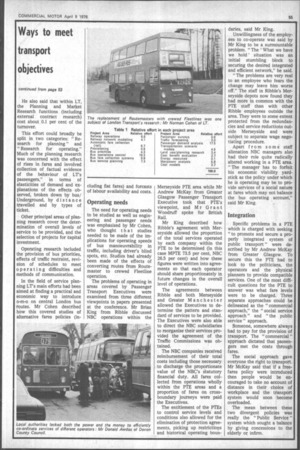Ways to meet transport objectives
Page 57

If you've noticed an error in this article please click here to report it so we can fix it.
continued from page 53
He also said that within LT, the Planning and Market Research functions (including external contract research) cost about 0.1 per cent of the turnover.
This effort could broadly be split in two categories: " Research for planning" and "Research for operating." Much of the planning research was concerned with the effect of rises in fares and involved collection of factual evidence of the behaviour of LT's passengers," in terms of elasticities of demand and explanations of the effects observed, broken down by bus/ Underground, by distance travelled and by types of ticket.
Other principal areas of planning research cover the determination of overall levels of service to be provided, and the selection of projects for capital investment.
Operating research included the provision of bus priorities, effects of traffic restraint, revision of schedules to meet operating difficulties and methods of communication.
In the field of service planning LT's main efforts had been aimed at finding a practical and economic way to introduce o-m-o on central London bus routes. Mr Cohen described how this covered studies of alternative fares policies (in cluding flat fares) and forcasts of labour availability and costs.
Operating needs
The need for operating needs to be studied as well as engineering and passenger needs was emphasised by Mr Cohen, who thought that studies needed to be made of the implications for operating speeds of bus manoeuvrability in traffic, including driver's blind spots, etc. Studies had already been made of the effects of converting routes from Routemaster to crewed Fleetline operation.
The problems of operating in areas covered by Passenger Transport Executives were examined from three different viewpoints in papers presented at the conference. Mr Brian King from Ribble discussed NBC operations within the Merseyside PTE area while Mr Andrew McKay from Greater Glasgow Passenger Transport Executive took that PTE's viewpoint, and Mr Grant Woodruff spoke for British Rail.
Mr King described how Ribble's agreement with Merseyside allowed the proportion of the total services operated by each company within the PTE to be determined (in this case MPTE 73.5 per cent, NBC 26.5 per cent) and how these figures were written into agreements so that each operator should share proportionately in future changes in the overall level of operations.
The agreements between Ribble and both Merseyside and Greater Manchester allowed the Executives to determine the pattern and standard of services to be provided. The Executives were also able to direct the NBC subsidiaries to reorganise their services provided the agreement of the Traffic Commissions was obtained.
The NBC companies received reimbursement of their total costs including those necessary to discharge the proportionate value of the NBC's statutory financial duty. All fares collected from operations wholly within the PTE areas and a proportion of fares on crossboundary journeys were paid the Executives.
The entitlement of the PTEs to control service levels and conditions also allowed for the elimination of protection agreements, picking up restrictions and historical operating boun daries, said Mr King.
Unwillingness of the employees to co-operate was said by Mr King to be a surmountable problem. "The What we have we hold' situation was an initial stumbling block to securing the desired integrated and efficient network," he said.
"The problems are very real to an employee who fears the change may leave him worse off." The staff in Ribble's Merseyside depots now found they had more in common with the PTE staff than with other Ribble employees outside the area. They were to some extent protected from the redundancies and service reductions outside Merseyside and were subject to separate wage negotiating procedure.
Apart f rom some staff alienation NBC managers also had their role quite radically altered working in a PTE area. "The manager has to forfeit his economic viability yardstick as the policy under which he is operating may be to provide services of a social nature at fares which may not balance the bus operating account," said Mr King.
Integration
Specific problems in a PTE which is charged with seeking "to promote and secure a properly integrated system of public transport" were described by Mr Andrew McKay from Greater Glasgow. To secure this the PTE had to look to the politicians, the operators and the physical planners to provide compatible services. One of the most difficult questions for the PTE to answer was what fare levels were to be charged. Three separate approaches could be delineated as the "commercial approach," the " social service approach" and "the public service" approach.
Someone, somewhere always had to pay for the provision of transport. The " commercial " approach dictated that passengers met the costs through fares.
The social approach gave everyone the right to transport. Mr McKay said that if a freefares policy were introduced then people would be encouraged to take no account of distance in their choice of workplace and the transport system would soon become overloaded.
The mean between these two divergent policies was really the "Public Service " system which sought a balance by giving concessions to the elderly or infirm.




























































































































